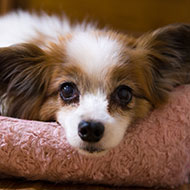
Study to explore motivations behind the recent increase in puppy sales.
The Royal Veterinary College (RVC) has been granted £10,000 from the Animal Welfare Foundation (AWF) to explore the motivations and behaviours of UK owners acquiring puppies during the COVID-19 lockdown.
Conducted by Dr Rowena Packer, a lecturer in Companion Animal Behaviour and Welfare Science at the RVC, the ‘pandemic puppies’ project will explore the recent increase in puppy sales: who bought them, why and how puppies were purchased during UK lockdown. Researchers hope that the data will inform future educational messaging.
Dr Packer explained: “The COVID pandemic has been the ‘perfect storm’ for a canine welfare crisis. My team’s previous research identified that puppy buying behaviour was already sub-optimal in the UK prior to the pandemic; for example, many purchasers performed insufficient pre-purchase research and purchased their puppy without seeing it with its mother.
“These problems are likely to have been dramatically exacerbated during lockdown, with unprecedented demand and competition for puppies being cashed in on by unscrupulous breeders and puppy traffickers."
She added: “Our project will take stock of how and why new owners went about purchasing their puppies during lockdown, and their future plans for their dogs. From this we will identify vulnerabilities to the health, behaviour and welfare of this puppy population, so we can effectively promote ways to safeguard their futures.”
The ‘Pandemic puppies’ project is one of five desk-based research projects receiving a grant from the AWF. Another project is exploring how the pandemic is affecting the health and welfare dogs, two projects are looking at the reasons behind delayed euthanasia in cats and dogs, and one will study the welfare impacts of different rat control methods.
AWF Chair Chris Laurence commented: “We received an excellent response to our call for desk-based research and were impressed with many of the projects that were submitted.The high number of puppies acquired from a wide variety of sources during the pandemic has been a major concern as they may have been bred and reared in unusual circumstances or have been imported from overseas.
"The lack of puppies’ socialisation may have lifelong effects on their behaviour and temperament making them more likely to need behaviour help and at greater risk of relinquishment later in life.”



 The Animal and Plant Health Agency (APHA) has updated its online reporting service for dead wild birds.
The Animal and Plant Health Agency (APHA) has updated its online reporting service for dead wild birds.